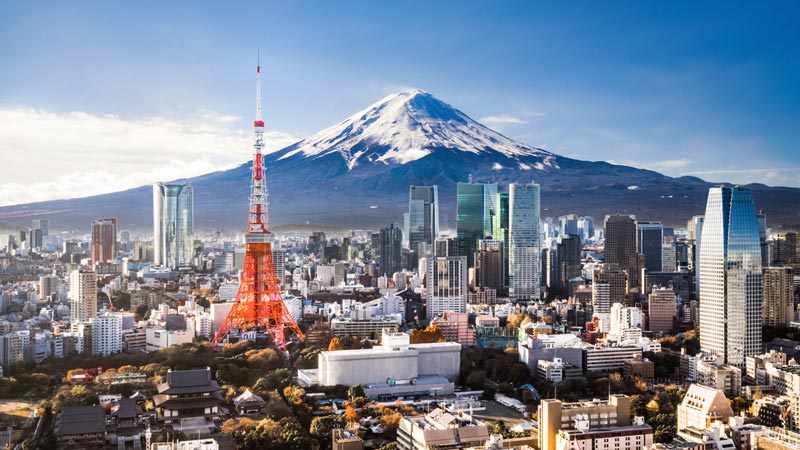Best Cities for Startups – Tokyo
Historically, Tokyo – and Japan in general – have been known more for their large corporations than for startups. But that is starting to change, thanks in part to an increasingly innovative culture and strong support from the government.

INITIAL, a Tokyo-based startup information platform, reports that Japanese startups raised about $4.8 billion in 2019, up from about $1 billion in 2011. According to Forbes, this development mirrors a long-term trend in venture capital flows, which are nearly at pre-2008 levels due to Japanese companies funneling money to startups. Because of these and other successes, Startup Genome named Tokyo the No. 15 city in the world for startups – the first time it has cracked the top 30 in the organization’s annual Global Startup Ecosystem Report.
Startup Genome gives Tokyo particularly high marks for its advanced manufacturing and robotics sectors. It points out that Japan is the world’s foremost industrial robot manufacturer, producing more than half of the global supply. The country also hosts the world’s first trade association for robots called the Japan Robot Association, whose members include Sony, Toshiba, and other top Japanese firms. Because of all this, robotics startups thus have done relatively well in Japan; for example, Synstpective, a space technology company, raised $99.9 million in a series A round in 2019. Fintech is also big in Tokyo, with the Global Financial Centers Index ranking the city as the seventh most competitive financial center in the world.
Startup Genome says Tokyo startups enjoyed $1.7 billion in early-stage funding last year, compared to the global average of $431 million. It also places the city’s 2020 ecosystem value at $25, compared to the global average of $10.5 billion. What’s behind these numbers, and why are founders increasingly choosing Tokyo as their companies’ home base? Read on to find out.
Significant Government Assistance
The Tokyo Metropolitan government is actively promoting startups in several ways. For example, the Startup Ecosystem Tokyo Consortium – made up of businesses, universities, and local governments – seeks to facilitate the creation and growth of startups in the private sector, academia, and the government. The ultimate goal is to strengthen Japan’s international competitiveness and boost overall economic development.
In addition, the federal government is trying to foster startups in Tokyo and other Japanese cities through its “Beyond Limits, Unlock Our Potential” strategy. Among other things, this seven-step plan includes:
- Creating a startup city specifically designed to encourage and support startups;
- Encouraging entrepreneurship education at Japanese universities;
- Establishing cutting-edge programs that collaborate with top accelerators from around the world and empower local corporate and university accelerators;
- Providing gap funding for tech startups;
- Improving the public procurement process for startups; and
- Increasing workforce mobility.
The national government has also certified three new startup visas, which allow foreign entrepreneurs receiving startup support from local governments to stay in Japan for up to a year. Like other countries with similar programs, Japan hopes its startup visas will help attract foreign talent and foster innovation. The national government also created an organization called J-Startup, which aims to boost the growth of top startups through networking and funding opportunities, and other assistance. And the bilingual Tokyo One-Stop Business Establishment Center allows founders and other representatives of overseas startups to work with consultants to get a foothold in Tokyo.
The University of Tokyo is getting in on the act as well. Since 2004, it has been assisting startups that seek to commercialize the university’s research by providing financial support, incubation facilities, rent-subsidized workspaces, legal and accounting assistance, and entrepreneurship classes. Startups can also apply to use university lab space.
A Changing Culture
Although Japanese culture has sometimes been viewed as conservative and risk-averse, those perceptions are changing.
“If you’re comparing the startup ecosystem in Japan to that in San Francisco, yeah, it’s much smaller, things move much slower, and it looks like Japan’s way behind,” Tim Romero of the Disrupting Japan podcast told the Tokyo Weekender. “If you compare Japan’s ecosystem today to the way it was 20 years ago, it’s unbelievably dynamic.”
According to Tokyo Weekender, Japanese corporations aren’t as apt to guarantee workers lifetime employment and steady promotions like they did in the late ‘90s. This makes it easier for entrepreneurs to raise money through early-stage investors and venture capitalists, as well as attract better talent.
These trends haven’t escaped the notice of foreign institutions like the Cambridge Center for Innovation (CIC), a US-based startup workspace company that now has a hub in Tokyo. CIC offers networking opportunities and collaborative work environments for Japanese entrepreneurs. It has hosted well-known startups, including Android Inc.
“Japan is far outperforming its population size with incredibly successful startups. We just call them companies now, like Honda Motor Company,” Tim Rowe, co-founder and CEO of CIC, told Forbes. “Today, Japan is at a turning point where many younger Japanese are excited and interested to take risks and build something new. Our view is that Japan has basic trust, science and research, and that there are opportunities now for Japanese people to start their own companies and accelerate the culture of entrepreneurship.”
A Large, Sophisticated Market
With the third-largest economy in the world valued at some $5 trillion, Japan is fertile ground for testing all sorts of products and services. Japanese consumers are generally well educated and well off. Moreover, the quality of life in Japan is famously good, with low crime and a high standard of living. This makes it both a great place to do business and a great place for workers to live. The transportation and communications infrastructure is excellent as well, which means employees can easily commute to work, and businesses can take advantage of state-of-the-art internet access and other technologies.
Finally, Japan, perhaps more than any other nation, is keen to develop cutting-edge technologies such as artificial intelligence, automation, and robotics to help with the demographic challenges it faces – in particular, a population that is aging faster than most. As a result, founders seeking to penetrate these markets should put Tokyo on their shortlist of cities in which to start a company.
About the Author

As an analyst of global affairs, Adriaan has an MSC from Oxford, with diverse interests in the digital economy, entertainment, and business. He is a specialist trainer in Advanced Analytics & Media.
Startup Resources
- Learn more about Startups
- Visit the TRUiC Business Name Generator
- Check out the TRUiC Logo Maker
- Read our Business Formation Services Review
- Find Startup Ideas
- Explore Business Resources
Form Your Startup
Ready to formally establish your startup? Click below to read our review of the best business formation services!
Best Business Formation Services